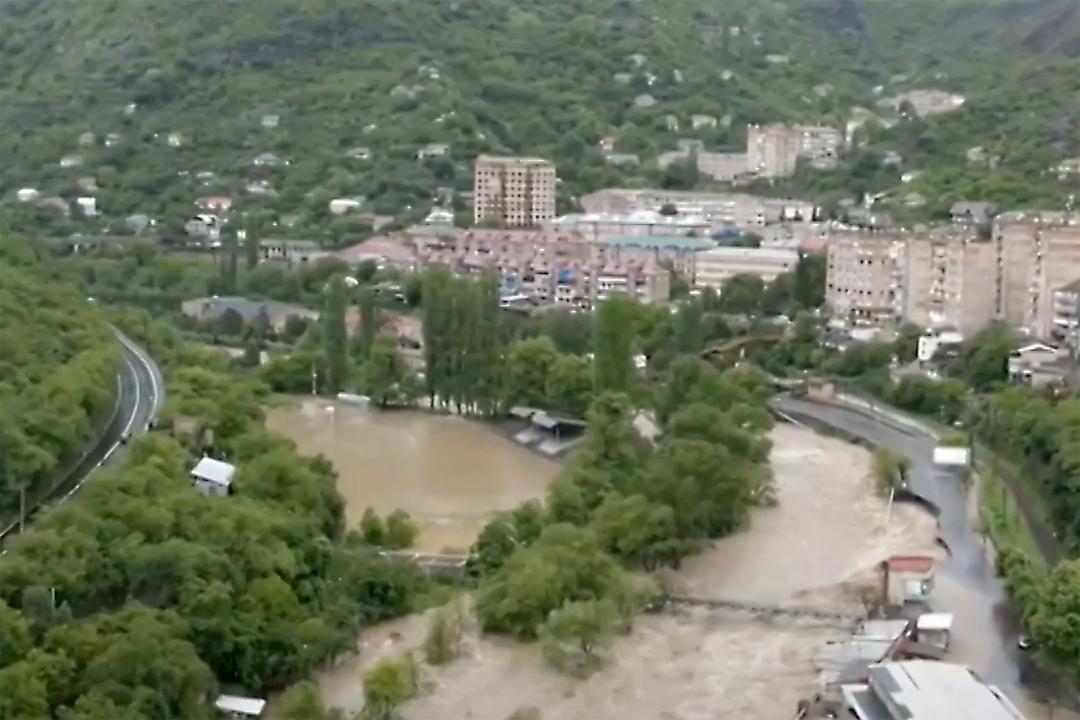
Pashinyan Leads Emergency Response to Lori and Tavush Flood Crisis

On May 27, Armenian Prime Minister Nikol Pashinyan chaired a remote meeting of the operational headquarters managing the emergency situation in the Lori and Tavush regions. The meeting was attended by Chief of Staff of Prime Minister Arayik Harutyunyan, Minister of Territorial Administration and Infrastructure Gnel Sanosyan, Deputy Minister of Internal Affairs and Director of Rescue Service Kamo Tsutsulyan, Lori Governor Aram Ghazaryan, Tavush Governor Hayk Ghalumyan, Alaverdi community head Davit Ghumashyan, Tashir Mayor Edgar Arshakyan, and Dilijan Mayor Davit Sargsyan.
At the beginning of the session, Prime Minister Pashinyan stated that the purpose of the session was to discuss the initial results of the operational headquarters' work in managing the consequences of the floods in the Tavush and Lori regions.
Gnel Sanosyan reported significant damage in the basins of the Aghstev and Debet rivers due to flooding, highlighting five zones with notable destruction: Alaverdi, Tashir, the section from Alaverdi to Ayrum, the section from Ayrum to Bagratashen, and the section from Dilijan to Ijevan. The greatest damage was recorded between Alaverdi and Bagratashen. Various infrastructures were damaged, including the M6 interstate road, bridges, railways, water lines, power lines, gas pipelines, and other structures.
Sanoysan also mentioned that nine settlements in the Alaverdi community faced connectivity issues due to damaged bridges. Efforts were underway to organize alternative transit routes. The water levels in the Debet River and other tributaries had decreased, facilitating coastal protection and other necessary works.
He reported that 14 bridges were damaged, five to six of which were smaller community bridges. Approximately 2,500 residents in Lori and 1,000 in Tavush were without electricity, and there were also issues with gas supply. The railway suffered significant damage, and the M6 road was severely impacted in multiple sections, though the M4 road, despite damages, remained passable.
Sanoysan informed that the displaced citizens had been sheltered either with relatives or in hotels and that food and other needs were being addressed through a storage point created in the Alaverdi community hall. The Rescue Service had evacuated 429 people, most coming from the Lori region.
Prime Minister Pashinyan inquired about the restoration plans for the destroyed infrastructure and emphasized the need for an urgent response regarding the M6 road restoration. He also instructed helicopters to provide supplies to blocked villages and conduct a thorough damage assessment.
During the session, international support was provided to address the existing problems. Summing up, the Prime Minister thanked the participants for their efforts and noted the prompt response of the local services, agencies, and rescue services, which helped mitigate the potential damage. He stressed the importance of focusing on short-term, medium-term, and long-term needs and making necessary revisions to road construction and urban construction standards based on the disaster's impact.
The number of flood victims was reported to be four.
See Also


Mirzoyan Meets US Deputy Assistant Secretary Joshua Huck

Azerbaijani President Holds Talks with UAE and German Business Delegations on Economic Cooperation

Grigoryan Confirms Armenia’s Readiness to Dissolve OSCE Minsk Group Upon Peace Treaty Signing

Azerbaijani Official Warns of Ecological Risks to Caspian Sea, Similar to Lake Urmia and Aral Sea

